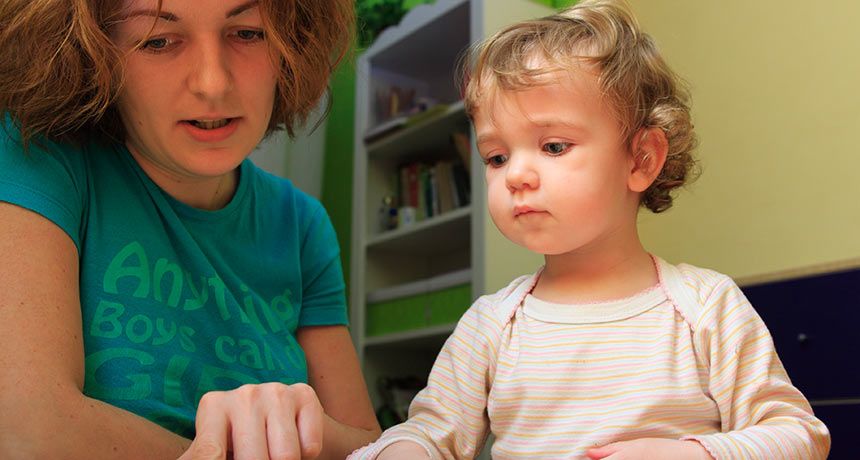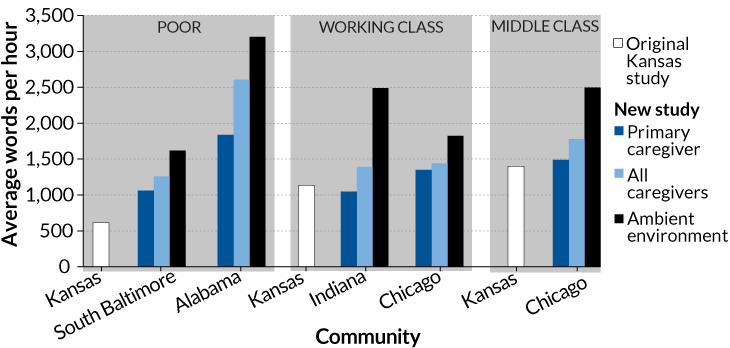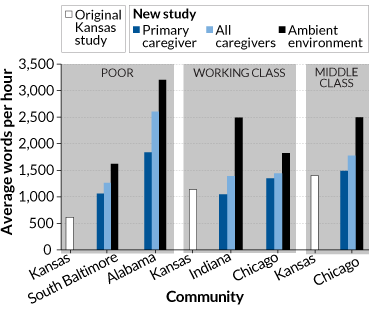Huge ‘word gap’ holding back low-income children may not exist after all
A study contests the idea that poor kids hear fewer words than kids from higher-income families

WORD UP A previous report that primary caregivers speak an average of 30 million more words to young children in middle-class and wealthy families, versus youngsters in poor families, doesn’t hold up on closer inspection, a new study finds.
artefy/iStockphoto
A scientific takedown of a famous finding known as the 30-million-word gap may upend popular notions of how kids learn vocabulary.
Research conducted more than 20 years ago concluded that by age 4, poor children hear an average of 30 million fewer words than their well-off peers. Since then, many researchers have accepted the reported word gap as a driver of later reading and writing problems among low-income youngsters. A Providence, R.I., program inspired by the study, for example, now teaches poor parents how to talk more with their kids.
But here’s the rap on the word gap: It doesn’t exist, says a team led by psychologist Douglas Sperry of Saint Mary-of-the-Woods College in Indiana. In a redo of the original study, virtually no class differences appeared in the number of words addressed to young children by a primary caregiver, Sperry and colleagues report in a study to be published in Child Development.
What’s more, after including speech spoken directly to children by various caretakers as well as family members’ conversations that the youngsters could easily overhear, kids in some poor and working-class communities heard more words on average than middle-class youngsters, the scientists say. Within each of those communities, some children heard many more words than others did despite belonging to the same social class, Sperry’s team adds.
“It’s time to turn a skeptical eye to the word-gap claim,” Sperry says.
Researchers usually treat word learning as a product of one or both parents regularly talking to a child. But different, equally effective ways exist for children to learn vocabulary, Sperry contends. Depending on culture and community, word learning depends to varying extents on a main caretaker talking to a child, many caretakers talking to a child and youngsters overhearing family members talking, he says (SN: 2/17/18, p. 22).
The original word-gap study included 42 children in Kansas from either of four communities — poor, working class, middle class or wealthy professional. Sperry’s group analyzed data on word use collected during home observations of 42 children in five communities — poor whites in South Baltimore, poor blacks in Alabama, working-class (largely blue-collar) whites in Indiana and Chicago, and middle-class (largely white-collar) whites in Chicago.
Everybody’s talking
In two studies about 20 years apart, researchers eavesdropped on families to tally how many words young children hear per hour. The new findings (colored bars) contradict an alleged “word gap” between poorer and more well-off kids found in the original study (white bars). In the original study, conducted in Kansas, researchers looked at the average numbers of words spoken hourly by primary caregivers to young children. In the new study, conducted in five communities, researchers counted the words per hour children heard from primary caregivers (blue), all caregivers (lighter blue), and overheard in their homes (black).
How many words per hour kids from different income levels hear


Videotaped home observations began when children were 18 to 30 months old. Intermittent observations continued until kids reached ages 32 to 48 months. Most primary caregivers were children’s mothers.
Primary caregivers in poor, black Alabama families directed an average of 1,838 words per hour to their children, close to the corresponding figure of 2,153 words per hour for high-income, white caregivers in Kansas in the original word-gap study. The earlier study reported that primary caregivers on welfare in Kansas spoke an average of 616 words per hour to their children, about one-third the total spoken to poor, black children in the new study. Primary caregivers from working-class and middle-class families in the new study uttered an average of 1,048 to 1,491 words per hour to youngsters.
Taking multiple caregivers into account, average hourly words spoken to children in each community increased by 17 percent or more. An increase of 58 percent occurred in Alabama’s poor, black households. In addition, kids in poor families overheard an average of 3,203 words per hour. Eavesdropping figures reached no higher than about 2,500 words per hour in the other households. Greater numbers of older siblings in the poor, black families contributed to that disparity, the researchers suspect.
The new study convincingly rejects claims of a word-gap for poor children, says cultural anthropologist Jennifer Keys Adair of the University of Texas at Austin.
White, middle-class parents and many educators wrongly assume that vocabulary learning always proceeds best via one-on-one interactions of parents with children, or teachers with grade-school students, Adair says. That assumption may not apply to kids from other cultural backgrounds. Adair has found, for instance, that first-graders from Latin American immigrant families — who were allowed to devise classroom projects, collaborate with one another and ask questions without raising their hands — did especially well three years later on state English assessments.
But some child researchers say the new study falls short of showing that poor kids are generally exposed to as much language as better-off peers.
Sperry’s group, for example, did not study children in upper-class, professional households, as researchers did in the 1990s. And other studies of early word learning point to a need for programs that help low-income parents engage their children in language-boosting conversations, conclude psychologist Roberta Golinkoff of the University of Delaware in Newark and colleagues in comment that will appear in the same journal.
“Overhearing language about death and taxes — topics of interest to adults — can never be as effective for language learning as participating in conversations about what matters to children,” Golinkoff and her colleagues write in their comment.
Kids frequently eavesdrop, Sperry responds. Ongoing research shows that “young children are very interested in talk that occurs around them, particularly when parents or siblings are talking about the child.”
While that may be so, little is known about the role of overheard speech and social context in language learning. Sperry and his colleagues plan to take a closer look at the difficult-to-study issue of how eavesdropping on family members influences later reading and writing skills.







